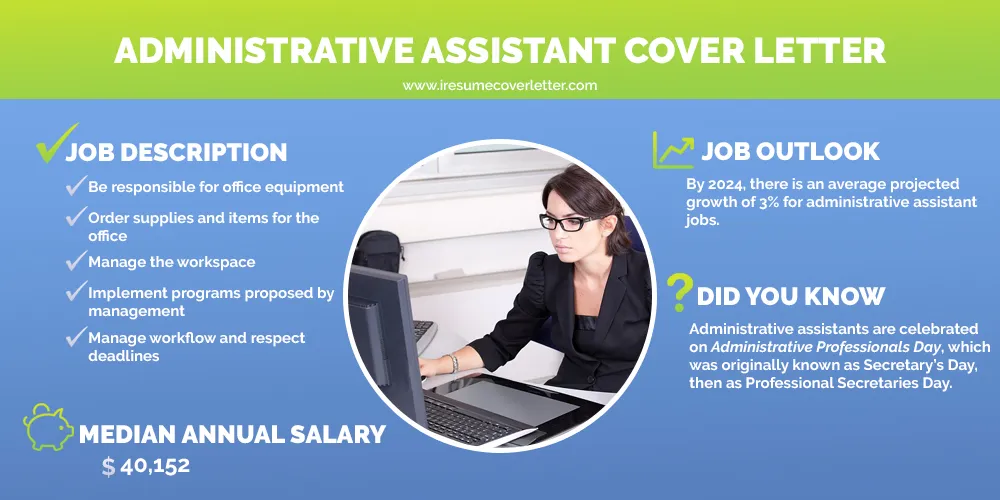What is an Admin Assistant Cover Letter?
An Admin Assistant cover letter is a document that accompanies your resume when applying for an administrative assistant position. It serves as an introduction, providing a brief overview of your skills, experience, and qualifications, while also highlighting why you are a suitable candidate for the specific role. Unlike a resume, which provides a comprehensive overview of your work history, a cover letter allows you to personalize your application, demonstrate your enthusiasm for the position, and showcase your written communication skills. A well-crafted cover letter can significantly increase your chances of getting noticed by hiring managers and securing an interview. It provides an opportunity to elaborate on specific experiences, connect your skills to the job requirements, and express your interest in the company and the role. Creating a strong cover letter can be the difference between landing an interview and your application being overlooked. The goal is to make a positive first impression and demonstrate your understanding of the role and the company’s needs.
Why is a Cover Letter Important?
In today’s competitive job market, a cover letter is crucial for several reasons. It allows you to go beyond the basic information presented in your resume and explain why you’re the perfect fit for the administrative assistant position. It provides an opportunity to showcase your personality, communication style, and genuine interest in the role and the company. A cover letter demonstrates your writing skills, attention to detail, and ability to articulate your thoughts, all essential qualities for an administrative assistant. Many hiring managers view a cover letter as a critical part of the application process, using it to assess your communication skills and enthusiasm. A well-written cover letter can help you stand out from other applicants, especially if you tailor it to the specific requirements of the job. It shows that you’ve taken the time to understand the role and are genuinely interested in contributing to the company’s success. Furthermore, it allows you to address any potential gaps or weaknesses in your resume, providing context and explaining how your skills and experiences align with the employer’s needs. Ignoring this important step can be a significant setback in your job search.
Key Components of a Cover Letter for Admin Assistant
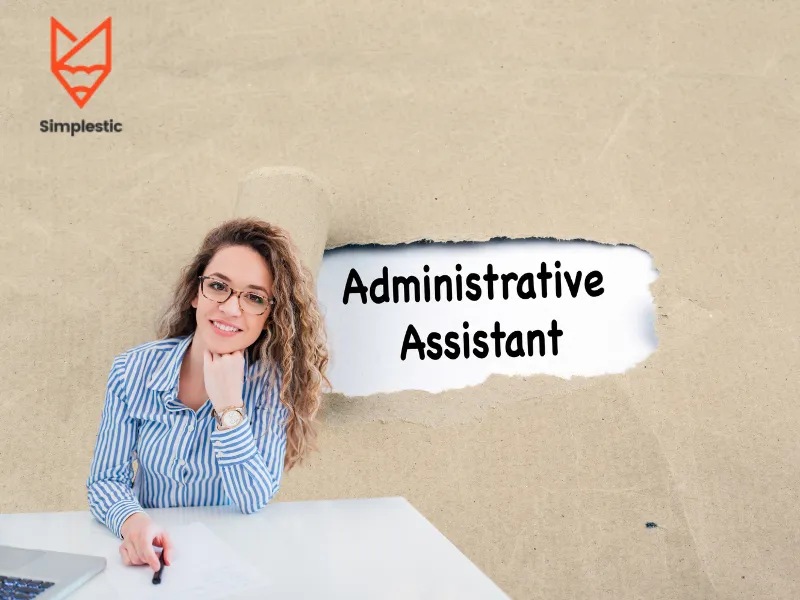
A compelling cover letter for an admin assistant position consists of several key components that work together to present you as a qualified and enthusiastic candidate. Each part plays a vital role in showcasing your skills, experience, and suitability for the role. Proper formatting and clear organization enhance readability, allowing the hiring manager to quickly grasp your key qualifications and interest. Understanding the essential elements of a cover letter is the first step toward creating a document that effectively highlights your strengths and increases your chances of securing an interview. Focusing on these components will ensure your application is polished, professional, and tailored to the specific job requirements, setting you apart from other applicants. Taking the time to perfect each element is an investment that can yield significant returns in your job search. This methodical approach ensures your cover letter is impactful and resonates with potential employers, ultimately leading to more opportunities.
Contact Information
At the top of your cover letter, include your contact information. This section should be clear, concise, and easy for the hiring manager to find. Include your full name, phone number, professional email address, and optionally, your LinkedIn profile URL. Make sure the contact details are up-to-date and accurate. This information ensures that the employer can quickly reach out to you to schedule an interview or request additional details. Using a professional email address is important. It is a sign of attention to detail and professionalism. Double-check your contact details before submitting the letter to avoid any errors. Consider using a font size slightly larger than the body text to make it easier to spot, especially for busy hiring managers. Properly formatted contact information is the foundation for a seamless application process.
Greeting the Hiring Manager
Addressing the hiring manager by name adds a personal touch and shows you’ve taken the time to research the company and the specific job posting. This demonstrates your attention to detail and your genuine interest in the position. If you can’t find the hiring manager’s name, research the company’s website or LinkedIn profiles to identify the person responsible for hiring. If you are unable to determine the name of the hiring manager, use a general greeting, such as “Dear Hiring Manager,” rather than something generic. A personalized greeting immediately grabs the reader’s attention and sets a professional tone. It shows that you are proactive and invested in the application process. This small detail can significantly improve the overall impact of your cover letter.
Introduction & Hook
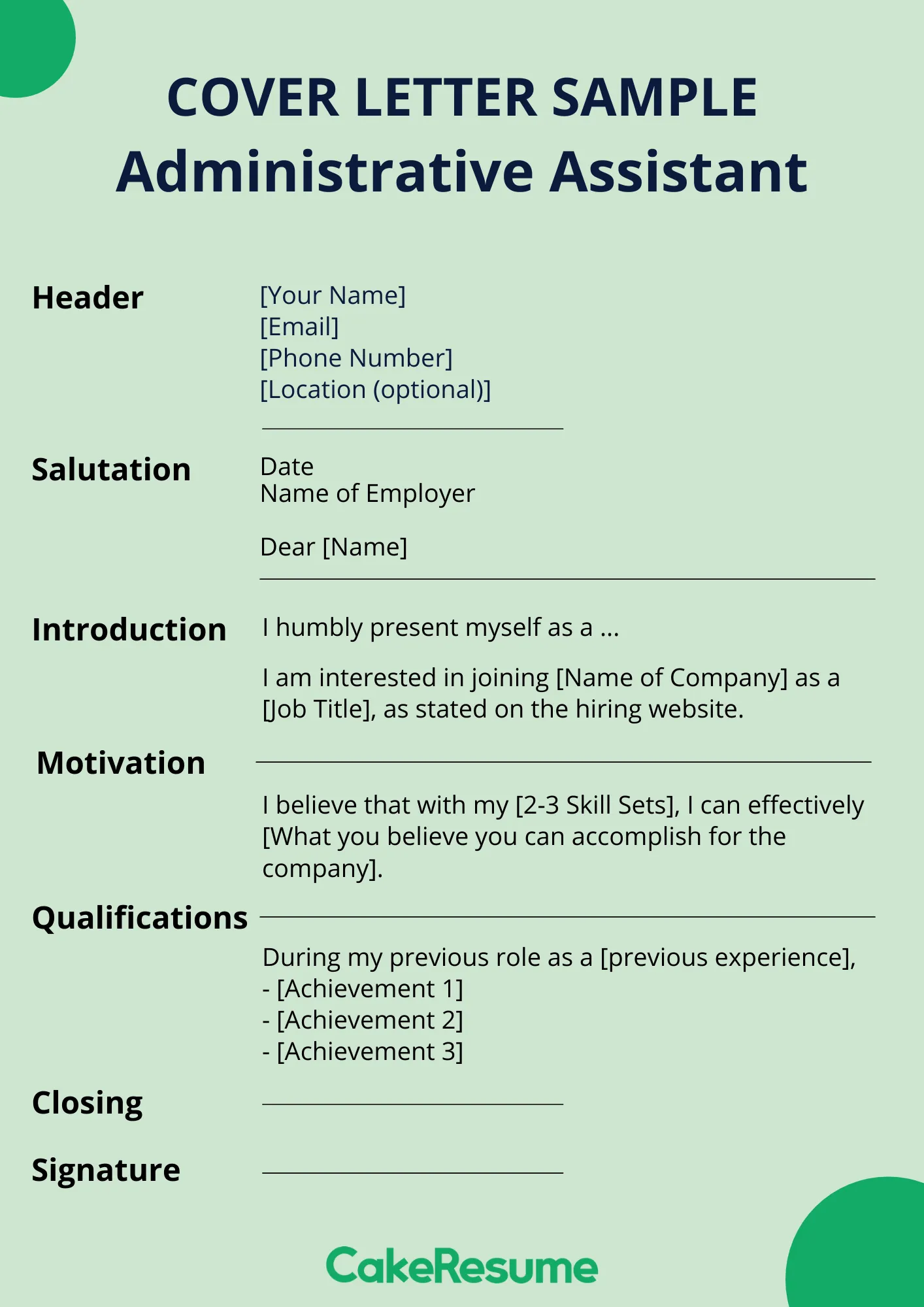
Your introduction is the first impression you make on a potential employer, so it needs to be compelling and grab their attention from the start. Begin by clearly stating the position you’re applying for and how you found the job posting. Briefly mention your key skills or experiences that make you a strong candidate. You can also include a brief sentence about your enthusiasm for the role or the company. The hook should be concise and capture the reader’s interest immediately. Consider starting with a strong statement about your relevant skills or a brief anecdote that highlights your ability to handle administrative tasks. The goal is to make the hiring manager want to read on. A well-crafted introduction sets the stage for the rest of the cover letter, making it clear why you are the perfect fit. A strong introduction immediately communicates your value and sets the tone for the rest of the letter.
Highlighting Relevant Skills
The core of your cover letter should focus on your skills and how they align with the job requirements. Use specific examples to illustrate your abilities and achievements. Mention how you have used these skills in previous roles to achieve positive outcomes. Tailor your letter to match the specific skills listed in the job description. Focus on the skills that are most relevant and highlight how you have successfully applied them in your previous roles. By providing tangible examples, you demonstrate your capabilities and create a strong case for why you should be considered for the position. Quantify your achievements whenever possible. For instance, instead of saying you improved efficiency, specify the percentage or the time saved. This provides concrete evidence of your impact and value. Highlighting relevant skills and providing clear examples is the key to showing that you meet the job’s expectations.
Administrative Skills
Emphasize your administrative skills, such as managing schedules, organizing files, handling correspondence, and preparing reports. Provide examples of how you have successfully handled these tasks in previous roles. Detail any experience with office equipment and software, such as Microsoft Office Suite, CRM systems, or other relevant tools. Highlight your ability to prioritize tasks, manage multiple projects simultaneously, and meet deadlines. Administrative skills are the foundation of any successful administrative assistant. These skills demonstrate your ability to keep the office running smoothly. Explain how you have used these skills to improve efficiency, reduce errors, and contribute to the smooth operation of an office. Being able to demonstrate a solid foundation in administrative skills is critical for any candidate.
Communication Skills
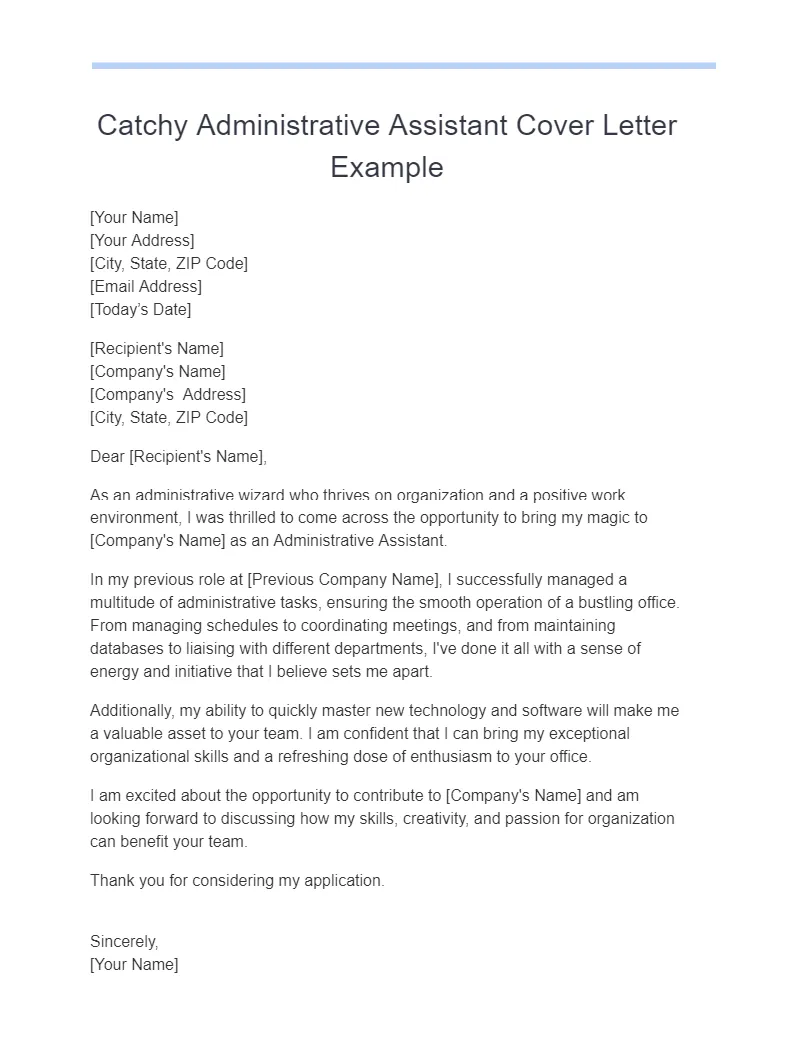
Highlight your excellent communication skills, both written and verbal. Explain how you have communicated effectively with colleagues, clients, and vendors. Provide examples of situations where you have used your communication skills to resolve issues, provide information, or build relationships. Mention any experience with customer service, including handling inquiries, resolving complaints, and providing support. Excellent communication skills are critical for an administrative assistant, as they interact with others daily. A strong communicator can navigate difficult conversations, provide clear and concise information, and build positive relationships. Highlighting examples of your communication skills is a great way to showcase your value to the hiring manager. Your ability to express yourself clearly and concisely will be a great asset.
Organizational Skills
Emphasize your organizational skills, including time management, attention to detail, and the ability to multitask. Describe how you have used organizational tools and strategies to manage your workload and stay on top of deadlines. Provide examples of how you have improved efficiency, reduced errors, or streamlined processes in previous roles. Organizational skills are essential for keeping the office running efficiently. Your ability to stay organized, manage your time effectively, and stay on top of tasks is key to success. Providing specific examples of how you have used these skills to improve efficiency, reduce errors, or streamline processes in previous roles will make a significant impact. Showing that you can manage multiple tasks simultaneously and meet deadlines is highly valued.
Experience and Accomplishments
In the body of your cover letter, provide detailed examples of your experience and accomplishments that demonstrate your skills and qualifications. Use the STAR method (Situation, Task, Action, Result) to structure your examples, making them clear, concise, and impactful. Focus on achievements that are relevant to the job requirements and highlight the positive outcomes you achieved. Quantify your accomplishments whenever possible by using numbers, percentages, or specific metrics. This gives the hiring manager concrete evidence of your value. Be specific and provide context. Instead of simply stating you “managed projects”, describe the size, scope, and outcomes. Clearly show what you did, how you did it, and the results of your actions. Use action verbs to make your descriptions more dynamic and engaging. Demonstrating your past accomplishments is the best way to convince the hiring manager that you can do the job well.
Quantify Achievements
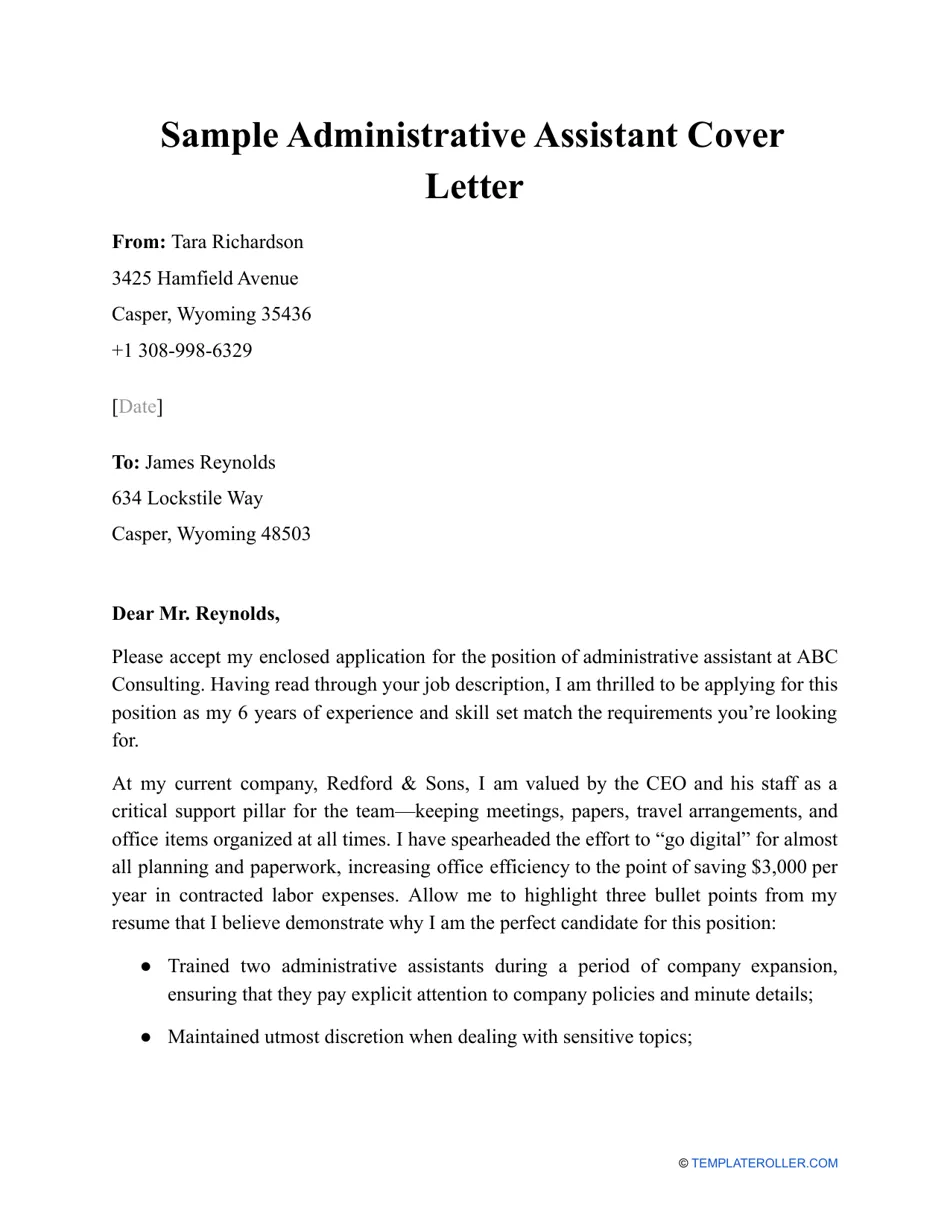
Whenever possible, quantify your achievements to demonstrate your impact and value to the company. Instead of saying you improved efficiency, specify the percentage or the time saved. For example, “Streamlined the filing system, reducing document retrieval time by 30%.” Or, “Managed a project budget of $50,000, completing the project under budget and on time.” Quantifying your achievements provides concrete evidence of your abilities and allows the hiring manager to understand the specific value you can bring to their team. This provides measurable results. Using numbers and statistics provides clear and objective evidence of your capabilities. This helps the hiring manager quickly assess your skills and their potential value to the organization. Quantifiable results make your application much more persuasive.
Tailoring Your Letter
Customize your cover letter for each job application. Avoid sending generic letters that could apply to any position. Carefully review the job description and tailor your cover letter to match the specific requirements and keywords. Highlight the skills and experience that are most relevant to the specific role. Demonstrate that you understand the company’s needs and are genuinely interested in the position. Research the company and show that you understand their mission and values. By tailoring your cover letter to each application, you demonstrate your attention to detail and your genuine interest in the position. Customization shows the hiring manager that you have taken the time to understand the role and the company’s needs. Addressing specific requirements and using keywords from the job description can significantly increase your chances of getting an interview. Tailoring your cover letter increases your chance of success.
Call to Action & Closing
In your closing paragraph, reiterate your interest in the position and the company. Include a call to action, such as requesting an interview or expressing your availability to discuss your qualifications further. Thank the hiring manager for their time and consideration. End with a professional closing, such as “Sincerely” or “Best regards,” followed by your full name. This is your final opportunity to make a strong impression and leave the hiring manager with a positive feeling. Make it clear that you are eager to move forward in the hiring process. A strong call to action leaves no doubt about your interest. Reiterate your enthusiasm. Your goal is to make it easy for the hiring manager to take the next step. A well-crafted closing paragraph reinforces your key selling points and ends the letter on a positive note.
Proofreading and Formatting Tips
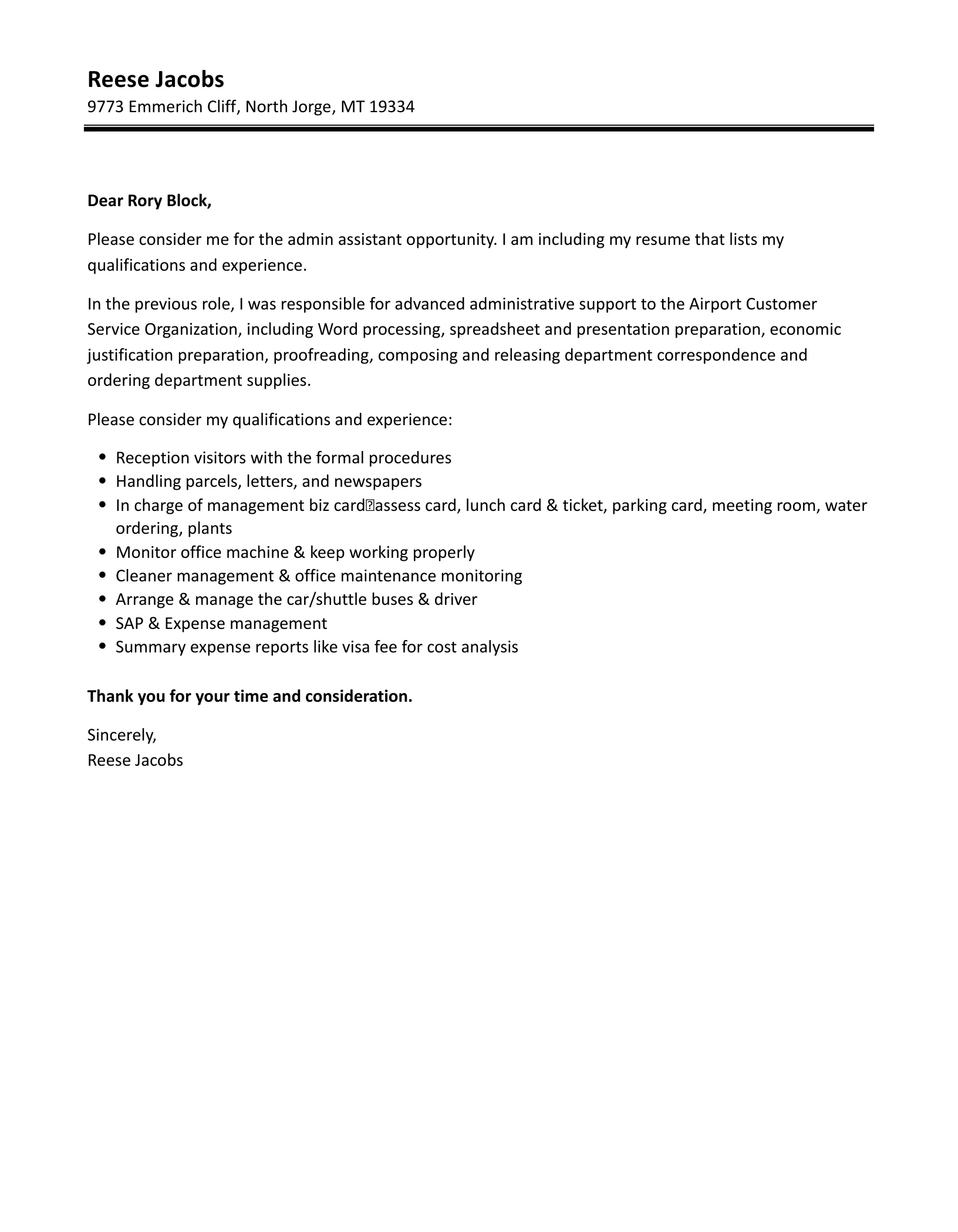
Before submitting your cover letter, proofread it carefully for any errors in grammar, spelling, and punctuation. Use spell-check and grammar-check tools, but also read the letter aloud to catch any awkward phrasing or typos. Ensure your formatting is consistent and professional. Use a standard font, such as Times New Roman or Arial, and maintain a readable font size. Use clear and concise language throughout your letter. Break up long paragraphs into shorter ones to improve readability. Ensure the letter is well-organized, with clear headings and subheadings. A well-formatted and error-free cover letter demonstrates your attention to detail and your commitment to professionalism. Proofreading is critical and shows you care. Pay attention to every word and every detail. Formatting contributes to the first impression. A clean and well-formatted cover letter makes a positive impact.
Common Mistakes to Avoid
Avoid common mistakes that can undermine your cover letter and reduce your chances of getting an interview. Do not use generic language or templates that are not tailored to the specific job. Avoid typos, grammatical errors, and unprofessional language. Do not make the letter too long. Keep it concise and focused on your key qualifications. Avoid being overly enthusiastic or using clichés. Never lie or exaggerate your skills or experience. Avoid negative language or criticizing previous employers. Make sure your cover letter complements your resume, it should not simply repeat the same information. Avoiding these mistakes can significantly improve the effectiveness of your cover letter. A well-crafted cover letter is more likely to get you noticed by the hiring manager. This gives you a better chance of securing an interview and ultimately landing the job. Always maintain a professional tone and highlight your strengths.
